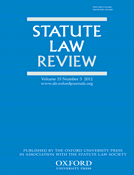
FORDHAM LAW REVIEW
Scope & Guideline
Pioneering Insights for Legal Minds
Introduction
Aims and Scopes
- Interdisciplinary Legal Analysis:
The journal publishes articles that incorporate insights from various disciplines, including sociology, psychology, and economics, into legal discourse, promoting a richer understanding of legal principles and their implications. - Focus on Current Legal Issues:
The Fordham Law Review is committed to addressing pressing legal issues, such as voting rights, criminal justice reform, and civil rights, ensuring that its publications remain relevant to contemporary societal challenges. - Innovative Legal Theory:
The journal showcases theoretical contributions that challenge traditional legal doctrines and propose new frameworks for understanding law, including discussions on constitutional interpretation, administrative law, and statutory analysis. - Practical Implications of Law:
The articles often explore the practical impacts of legal rules and decisions, providing insights into how legal principles are applied in real-world scenarios, particularly in areas like criminal justice, corporate law, and family law. - Historical Context and Evolution of Law:
The journal emphasizes the importance of historical perspectives in understanding current legal issues, with articles that trace the evolution of legal doctrines, statutes, and judicial interpretations.
Trending and Emerging
- Civil Rights and Social Justice:
There is a marked increase in articles focusing on civil rights, social justice, and equity issues, reflecting a growing societal demand for legal scholarship that addresses systemic inequalities and promotes the rights of marginalized groups. - Criminal Justice Reform:
Recent publications have increasingly tackled topics related to criminal justice reform, including discussions on sentencing practices, police accountability, and the rights of defendants, highlighting a trend toward examining and advocating for changes in the criminal justice system. - Technology and Law:
The intersection of technology and law is becoming a significant focus, with emerging themes addressing issues such as data privacy, intellectual property in the digital age, and the legal implications of artificial intelligence and blockchain technology. - Health Law and Pandemic Response:
In light of recent global events, there is a burgeoning interest in health law, particularly regarding the legal frameworks governing public health, vaccination mandates, and the regulation of healthcare practices during pandemics. - Voting Rights and Electoral Law:
With ongoing debates surrounding electoral integrity and access, there has been a resurgence of interest in voting rights and electoral law, with articles exploring legislative changes, litigation strategies, and the impact of judicial decisions on democratic participation.
Declining or Waning
- Focus on Traditional Corporate Law:
Earlier issues featured a significant number of articles centered on traditional corporate law topics. More recently, there has been a shift towards exploring issues of social justice and civil rights, leading to a relative decline in corporate law discussions. - Limited Coverage of International Law:
The journal previously published numerous articles on international law and comparative legal studies. However, recent trends show a decrease in this focus, with fewer contributions addressing global legal frameworks and their implications. - Reduction of Historical Legal Analyses:
There has been a noticeable decrease in articles that provide extensive historical analyses of legal principles and cases, as the current trend leans more toward contemporary issues and practical applications of law. - Diminished Emphasis on Legal Ethics:
While legal ethics remains an important area, the volume of articles specifically addressing ethical dilemmas and professional responsibility has waned, as discussions increasingly encompass broader legal and social issues. - Less Attention to Environmental Law:
Although environmental law was once a prominent theme, recent publications indicate a decline in articles dedicated to environmental issues, as focus shifts to pressing social justice and civil rights matters.
Similar Journals

Canadian Journal of Law and Jurisprudence
Shaping the Future of Jurisprudence, One Article at a TimeCanadian Journal of Law and Jurisprudence, published by Cambridge University Press, serves as a pivotal platform in the field of legal studies, particularly recognized for its comprehensive exploration of jurisprudence in the context of Canadian law. While the journal operates without an open access model, its ISSN 0841-8209 and E-ISSN 2056-4260 ensure broad academic accessibility. Based in the United Kingdom, it has established a notable impact within its category, maintaining a Q3 ranking in Law according to the latest 2023 metrics. With its convergence of issues from 1996 to 2003, periods in 2007, and recently from 2012 to 2024, the journal embraces a rich historical context while addressing contemporary legal challenges. Ranked #439 out of 1025 in the social sciences category on Scopus, the journal is positioned within the 57th percentile, highlighting its significance and influence in legal scholarship. Aimed at researchers, professionals, and students, the Canadian Journal of Law and Jurisprudence is an essential resource for those seeking to deepen their understanding of the evolving landscape of law and its philosophical underpinnings.

Adelaide Law Review
Fostering critical analysis in the realm of law.The Adelaide Law Review, published by the University of Adelaide, stands as a notable journal in the field of law, offering valuable insights into a wide range of legal topics relevant to practitioners, scholars, and students alike. With an ISSN of 0065-1915 and a history of publication that has evolved from 2019 to 2023, it serves as a platform for the dissemination of rigorous legal scholarship. Although currently categorized in Quartile 4 within the law category, the journal remains instrumental in contributing to legal discourse, particularly in the Australian context. With a Scopus ranking of #733 out of 1025 and a 28th percentile ranking in Social Sciences Law, the Adelaide Law Review is committed to advancing the understanding of vital legal issues through thoughtful articles, case analyses, and critical commentaries. This journal provides an essential resource for legal professionals and academic researchers seeking to engage with contemporary legal challenges. While it does not offer open access at this time, its scholarly contributions ensure it remains a respected publication within the legal community.

SYDNEY LAW REVIEW
Contributing to Global Legal DiscourseSYDNEY LAW REVIEW is a prestigious academic journal published by the Sydney Law School, dedicated to the field of legal studies and interdisciplinary analysis of law and its impact on society. With its ISSN 0082-0512 and E-ISSN 1444-9528, this journal serves as a vital resource for legal scholars, researchers, and practitioners in Australia and globally. The journal has undergone several phases since its inception in 1990, reflecting the evolving landscape of legal scholarship and policy. Although currently not an open-access publication, it remains a significant contributor to legal discourse, maintaining a Q4 ranking in the Law category as per the 2023 category quartiles. The SYDNEY LAW REVIEW encourages submissions that critically explore contemporary legal issues, thereby fostering a robust platform for academic inquiry and professional advancement.

CORNELL LAW REVIEW
Exploring the Frontiers of Legal Thought.The Cornell Law Review, published by Cornell Law School, stands as a premier legal journal in the United States, recognized for its scholarly contributions to the field of law since its inception. With a robust ISSN and E-ISSN of 0010-8847, this journal is dedicated to facilitating high-level discourse and providing a platform for legal scholars, practitioners, and students to explore significant legal issues. The journal has earned an impressive Q1 ranking in the 2023 category of Law, placing it within the top tier of scholarly journals as per Scopus, where it ranks #302 out of 1025 in the Law field, further highlighted by its 70th percentile ranking. Although not open access, its rigorous editorial standards and comprehensive analyses make it an essential resource for those engaged in legal research and scholarship. Each published volume enriches the academic community with insightful articles covering a diverse array of legal topics, ensuring its relevance in today’s evolving legal landscape. Whether for advancing scholarly research or informing professional practice, the Cornell Law Review remains a vital resource for anyone dedicated to the study and application of law.

University of Western Australia Law Review
Navigating the Complexities of Legal ThoughtThe University of Western Australia Law Review is a prestigious academic journal dedicated to the critical examination and exploration of legal issues in Australia and beyond. Published by the Law School of the University of Western Australia, this journal has become a significant resource for legal scholars, practitioners, and students alike, contributing to the rich discourse in the field of law. With an ISSN of 0042-0328 and a current categorization in the Q3 quartile in the field of Law as per the 2023 rankings, it stands among a cohort of respected legal publications. The journal, though not open access, facilitates a sharing of unique insights and research from 2019 to 2024, aiming to address emerging and traditional legal challenges within a global context. With a Scopus rank of #651 out of 1025 in Social Sciences Law, it holds a percentile of 36, reflecting its valuable contributions to legal scholarship. The University of Western Australia Law Review invites researchers, practitioners, and students to engage with its rich content and to contribute to the ongoing dialogue shaping the future of law.

De Jure Law Journal
Empowering Legal Minds Through Open Access Research.De Jure Law Journal, published by Pretoria University Law Press, is a reputable open access journal that has been serving the legal community since its establishment in 2011. With its commitment to disseminating high-quality research, this journal focuses on various aspects of law and legal principles, encompassing a broad range of topics from constitutional law to international legal frameworks. The journal's ISSN 1466-3597 and E-ISSN 2225-7160 ensure that it is easily accessible and widely recognized in academic circles. Positioned as a significant contributor to legal scholarship in South Africa and beyond, De Jure Law Journal is dedicated to fostering a critical dialogue among researchers, practitioners, and students alike, making it an essential resource for anyone engaged in legal studies.

Statute Law Review
Pioneering Insights in Statute Law ResearchStatute Law Review is an esteemed academic journal dedicated to the critical examination and analysis of statute law, publishing a broad range of scholarly articles that illuminate contemporary legal issues and enhance understanding within this specialized field. Published by Oxford University Press, the journal has been at the forefront of legal scholarship since its inception in 1980, and it continues to play a vital role in advancing legal discourse. With an impressive commitment to quality, Statute Law Review holds a Q3 quartile ranking in the law category and is recognized within the Scopus rankings as 694th out of 1025 in Social Sciences _ Law, indicating its relevance and contribution to the field. Although it is not an open-access journal, its rigorous peer-review process ensures that only the highest caliber of research is disseminated, making it an invaluable resource for researchers, practitioners, and students alike. As it converges into 2024, the journal remains a key platform for disseminating innovative ideas and fostering dialogue on the evolution and implications of statutory interpretation and application.

MINNESOTA LAW REVIEW
Navigating the Evolving Landscape of Legal PrinciplesMINNESOTA LAW REVIEW is a prestigious academic journal dedicated to advancing legal scholarship and discourse, published by the MINN LAW REVIEW FOUND in the United States. Established in 1976, this journal has become a cornerstone in the field of law, achieving an impressive Q1 ranking in the Law category for 2023, underscoring its significance and influence in legal studies, with a Scopus rank placing it in the 65th percentile among social sciences law journals. The ISSN number for both print and electronic editions is 0026-5535, ensuring broad accessibility to its scholarly contributions. With a commitment to publishing innovative and analytical articles that address contemporary legal issues, the MINNESOTA LAW REVIEW serves as an essential resource for researchers, students, and legal professionals seeking to deepen their understanding and engage with critical legal concepts. While it does not currently provide open access, its wide array of topics spans various disciplines within law, fostering a vibrant academic community dedicated to the exploration of legal principles and their applications. The journal’s editorial office can be found at 229 19TH AVE SOUTH, UNIVERSITY OF MINNESOTA, MINNEAPOLIS, MN 55455, where a team of experts curates content that reflects the evolving landscape of legal thought.

VIRGINIA LAW REVIEW
Exploring the Intersection of Theory and PracticeVIRGINIA LAW REVIEW is a preeminent legal journal published by the University of Virginia Law Review Association, recognized for its rigorous scholarship and intellectual discourse in the field of law. With an ISSN of 0042-6601, this journal has maintained a prominent position in academia, reflected in its Q1 category ranking in law and a Scopus ranking of #167 out of 1025, placing it in the top 17% of its field. Drawing upon a rich tradition dating back to its inception in 1967 and covering a broad spectrum from legal theory to practical applications, the Virginia Law Review aims to foster innovative legal thought and engage both scholars and practitioners. While it does not currently operate under an open access model, its contributions to scholarly research are invaluable, providing insights that significantly influence legal practices and policies. Situated in Charlottesville, Virginia, at 580 Massie Road, this esteemed publication appeals to researchers, legal professionals, and students alike, making it an essential resource for anyone eager to delve into the complexities of contemporary legal issues.

Melbourne University Law Review
Advancing Legal Scholarship with Insightful AnalysisMelbourne University Law Review, published by the MELBOURNE UNIV LAW REVIEW ASSOC, stands as a pivotal journal in the realm of legal scholarship in Australia and beyond. With an ISSN of 0025-8938 and an E-ISSN of 1839-3810, this esteemed publication has been a cornerstone for legal discourse since its inception. Designed to foster rigorous analysis and extensive debate, the journal covers diverse aspects of law, providing researchers, practitioners, and students an invaluable platform to engage with contemporary legal issues. The journal has demonstrated a commitment to high-quality scholarship, achieving a Q2 ranking in Law for 2023, further solidifying its importance within the academic community. Although not an open-access publication, the Melbourne University Law Review ensures that contributions remain accessible through institutional subscriptions, enhancing its reach and reinforcing its role as a critical resource for those dedicated to advancing legal knowledge and practice. For all stakeholders in the field of law—be they established academics or emerging professionals—this journal serves as a vital repository of innovative ideas and legal analysis.